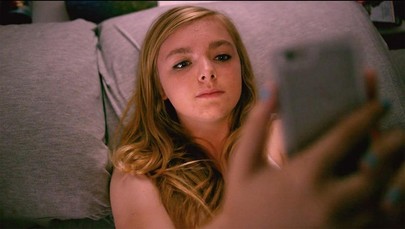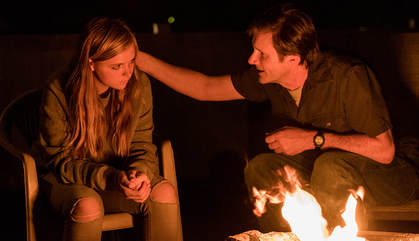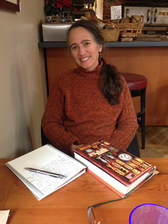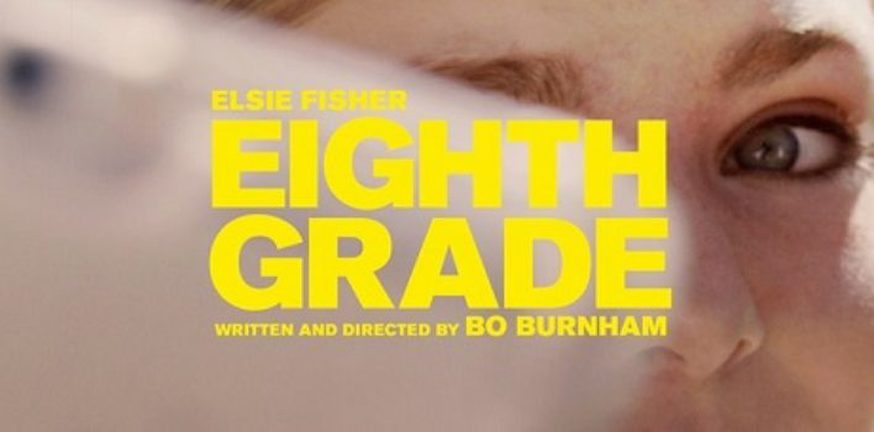|
What It’s Really Like: Eighth Grade, Directed by Bo Burnham What I liked most about Burnham’s feature film, Eighth Grade, was its unsplashy truthfulness. Main actress, Elsie Fisher, looked and acted like a real eighth-grader, gawky in her body, sporting acne and baby fat, speaking with the rising inflections and emotive fillers of the young—a believable mix of idealism and despair. Her single father is neither perfect nor awful. Her schoolmates aren’t friendly, but neither are they overt bullies. The challenges she navigates during her last week of middle school could lead to disaster, but don’t. No wrists are slit, no one is assaulted. She experiences both disappointments and small gains. Kayla Day, Burnham’s protagonist, suffers from anxiety. She’s socially awkward, but she’d give anything not to be, creating her own videos for YouTube largely to encourage herself since (maddeningly for her) she has almost no followers. The movie does a great job navigating between her videos of “How to Be Yourself,” “Putting Yourself Out There,” “How to Have Confidence,” made in the guise of a wiser, more adept persona who dispenses the very advice she needs to hear in the moment, and her awkward attempts to put them into practice. Kayla parts her long hair in the middle, pulling both sides around front, perhaps to give herself a curtain to hide behind. As a result, we spend a lot of time looking at the exposed nape of her neck, a part of the body that underscores her vulnerability. Kayla’s single dad is the quintessential well-meaning but awkward father, ever-ready to launch “dad jokes” many of which rely heavily on goofy voices. He tries to get her to take out her earphones at the dinner table and connect with him, but only ever manages a few sentences before getting eye-rolls and “Oh Dads!” Even when he doesn’t talk, he gets yelled at, as when Kayla tells him not to be so quiet and look at her so weirdly when he’s driving. He clearly cares about Kayla and wants her to know that. However, for most of the movie, he’s clueless about the precise nature of her suffering (as parents tend to be) if not its depth. Once when Kayla tells him to stop worrying about her, that her life is great, he looks appropriately skeptical but willing to play along if she insists. Another effort that backfires is when he follows her to the mall when she meets up with a group of new high school “friends” and gets caught spying on her to her great mortification. He is there for her, though (a welcome portrayal in a time of so many movies about abusive or absent parents). When he and Kayla finally have a breakthrough moment, he seems as surprised as anyone, and his facial expression as she finally hugs him is priceless.  Burnham shows us Kayla navigation of her budding sexuality in ways that seem wholly believable. She repeatedly tries to get her crush, Aiden, to notice her without making an idiot of herself. (She doesn’t succeed.) She practices kisses on her own hand late at night, pretends familiarity with, and even promises her crush sex acts that she then has to google (and which gross her out too much to follow through on). During one potentially dangerous situation, Kayla’s anxiety actually ends up serving her well, giving her the wherewithal to escape an unwanted sexual overture. Her ability to listen to her own discomfort, to say no and mean it, demonstrate to the viewers that she has a lot more self-confidence than she gives herself credit for. The movie even gets social media right—appropriately skeptical, yet not demonizing it. Yes, Kayla overuses it when she’s feeling awkward and lonely, but part of her purpose in doing so is to find tips on how to overcome her anxieties and to reach out to others. She compares herself to those she feels are happier and more popular, yet these very comparisons spur her on to try activities which terrify her. She flirts with dangerous practices like sexting the wrong guy, yet also seems to find the right guy through accepting responding to his text. It is a shocker to see how often middle-schoolers are on their phones during school hours, but as a teacher of young adults, this seems an accurate depiction—any second of down time, boredom, or distraction sends them to their screens. When we see Kayla talking to her father in the car in one of the closing scenes of the movie, it seems a huge victory, a shift in their relationship and in Kayla’s willingness to be vulnerable. There are a couple false moments—in her big talk with her dad near the end of the film, her part seems spot on, while his seems too Hallmark and goes on too long for this otherwise honest, awkward film. Similarly, at the eleventh hour, she has words with two classmates who haven’t been kind; however, I don’t think Kayla would have done this wearing the cloak and mortarboard of graduation. It seems like Burnham wants to tie up loose ends before the credits role. (Interestingly, I watched a short interview with him and his star in which Burnham had the annoying habit of interrupting Fisher and talking over her. The weak moments in the film echo this—they come precisely when Burnham seems to lose faith in his strong actress’ ability to carry the film through her honest self-expression.)  To conclude, Eighth Grade presents us with a number of nested messages. All the graduating eighth-graders get back the time capsules that they prepared for themselves as sixth-graders. We watch Kayla bemusedly rifle through this earnest hope chest from her younger self, trying to determine if she’s made any progress at all. We sense she’s doubtful, yet when we listen to the new message that she records for her twelfth-grade self, we realize how much self-awareness she has gained in middle school, much of it, of course, in this closing, event-filled week. Maturity, the film reminds us, is a never-ending process. For adult watchers, the movie itself speaks to us with the voice of our own awkward and earnest child within. We also get an opportunity to assess how far or how little progress we’ve made since our own painfully-awkward or anxious middle-school days. I’m willing to guess that, as it was for Kayla listening to her own sixth-grade self, we’re a mixed bag—more confident in some areas, but essentially the same awfully/wonderfully-flawed person we’ve always been. In short, Eighth Grade is a moving, generous, clear-eyed film. If you can get them to come, bring your teenaged kids. I took my seventeen-year-old son and my twenty-one-year-old daughter in two separate screenings, and we had plenty to talk about. (Just be sure, during the film, not to be like Kayla’s dad at the dinner table. Give your kids space to feel what they feel.)  Devon Balwit teaches in Portland, OR. She has six chapbooks and two collections out or forthcoming: How the Blessed Travel (Maverick Duck Press); Forms Most Marvelous (dancing girl press); In Front of the Elements (Grey Borders Books), Where You Were Going Never Was (Grey Borders Books); The Bow Must Bear the Brunt (Red Flag Poetry); We are Procession, Seismograph (Nixes Mate Books), Risk Being/ Complicated (with the Canadian artist Lorette C. Luzajic), and Motes at Play in the Halls of Light (Kelsay Books). Her individual poems can be found here and in Cordite, The Cincinnati Review, The Carolina Quarterly, Fifth Wednesday, Red Earth Review, The Fourth River, The Free State Review, Rattle, Posit, and more. Comments are closed.
|
AuthorWrite something about yourself. No need to be fancy, just an overview. Archives
April 2024
Categories |

 RSS Feed
RSS Feed
